
 Nathan Moser
The Hockey Writers
Nathan Moser
The Hockey Writers
40
Reads
0
Comments
Philadelphia Flyers’ Best Defensemen of All-Time
An old saying in sports goes that “defense wins championships.” While offense and goaltending play key roles in winning hockey games for sure, defense is so crucial. This is especially the case because they help the goalie with their aggressive style and hitting to try and create better vision for the netminder as well as clear the crease from any offensive threats. Not to mention, some of them can get in on the scoring action as well.
Related: Revisiting the Brayden Schenn Trade
The Philadelphia Flyers have had many solid defensemen suit up for their franchise in their 52-year existence. However, there are some that have stood out for the organization and are remembered for representing the Orange and Black specifically. These are some of the best to ever play for the team (they are not all in a particular order).
Barry Ashbee
Barry Ashbee had a different journey through his NHL career than other names on this list. He did not become a mainstay in the league until he was 31 years old, and his time in the league was only a few seasons. He did not post fantastic numbers while representing the Flyers either.
What made him a standout was his determination for hard work, and not stopping that hard work for any reason. He was someone who scratched and clawed his way in order to get the opportunities he was given. He was handed nothing. His mindset was that if you were not succeeding, then you need to work even harder.
Having this kind of mindset can be infectious in a locker room. Fellow teammates see the work ethic put into improving his game, and other players want to try just as hard. It is motivating and can bring an entire team-up. Ashbee helped set up the mental attributes of the locker room at the time.
He played during the “Broad Street Bullies” era like a few other names on this list as well. This was a rough-and-tough era for the Flyers team. They played a harder-hitting, more aggressive style of play than other teams did.
Related: Flyers Showdown – Lindros vs. Clarke
Ashbee was a perfect puzzle piece for this kind of hockey. He was good at dishing out hard checks and had a gritty, rugged mentality against his opponents. His teammates appreciated everything that he did on the ice. Unfortunately, though, he would be forced to retire due to getting hit in the eye with a puck. The Flyers still wanted Ashbee around, and he took an assistant coaching role as a result.
Ashbee was diagnosed with leukemia in 1977 and passed away shortly after. His jersey was retired by the team that same year. The Flyers also created the Barry Ashbee Trophy, which honors the best defenseman for the team for each season. Radko Gudas was the winner of the award in 2018-19.
Behn Wilson
Wilson was a player who had a great hockey IQ, and also brought the physicality along with it. He was another player who fit the tough Flyers mentality, and got into his own share of scraps during his time with the team. He ended up playing a total of nine seasons in the NHL, five of those being in Philadelphia.
During his time donning the Orange and Black, he accrued the following numbers:
- 1978-79: 13 goals and 36 assists for 49 points in 80 games
- 1979-80: 9 goals and 25 assists for 34 points in 61 games
- 1980-81: 16 goals and 47 assists for 63 points in 77 games
- 1981-82: 13 goals and 23 assists in 59 games
- 1982-83: 8 goals and 24 assists for 32 points in 62 games
Wilson might have only played in a Flyer sweater for five seasons, but how he performed on the ice made him a top defender for the team. Being a defenseman, the numbers he tallied offensively were impressive. His game went beyond point totals though – Wilson was absolutely fearless. He got into his fair amount of fights, and was able to throw down with some of the best. He would gladly stand up and not get pushed around by other teams’ players. That was a tone he set for the rest of the team: do not let anyone push you around. Fight back (either metaphorically or in his case, literally).
Wilson later finished his NHL career with the Chicago Blackhawks, and officially retired in 1989.
Kimmo Timonen
Timonen, along with winger Scott Hartnell, was traded by the Nashville Predators to the Flyers in the summer of 2007. It was a move by then-general manager Paul Holmgren to add more skill all throughout the lineup after finishing as one of the worst teams in the league the previous season.
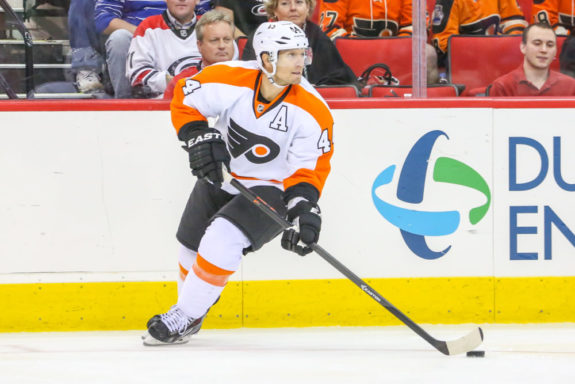
Timonen spent a total of seven seasons in the Orange and Black, and racked up enough points to finish third all-time in Flyers scoring by a defenseman. While the blueline changed over the course of various seasons, one thing remained the same – Timonen was always the main guy. Yes, there were other big names who made their presence felt like Hockey Hall of Famer Chris Pronger, but in a way, it was still Timonen’s blue line.
He wore an ‘A,’ being a leader for not just the younger defenseman in the lineup but for the team as a whole. His leadership and experience under his belt were a valuable asset (he ended up finishing his playing career with 1,108 regular-season games played and an additional 105 games in the postseason). He helped lead the backend as the Flyers went to the Stanley Cup Final in 2010. During the 2010 playoffs as a whole, Timonen produced one goal and 10 assists in 23 games.
Related: All-Time Best Player from Every NHL Team
Timonen finished his Flyer career with 38 goals and 232 assists for 270 points.
Andre Dupont
Andre Dupont, nicknamed “Moose,” was a journeyman defenseman before joining the Flyers. He had short stints with the New York Rangers and the St. Louis Blues, before being acquired by Philadelphia. His time with the Flyers was when his career really took off and broke out in the NHL, posting career highs with the team on multiple occasions.
His stats as a Flyer are below:
- 1972-73: 3 goals and 20 assists in 46 games
- 1973-74: 3 goals and 20 assists in 75 games
- 1974-75: 11 goals and 21 assists in 80 games
- 1975-76: 9 goals and 27 assists for 36 points in 75 games
- 1976-77: 10 goals and 19 assists in 69 games
- 1977-78: 2 goals and 12 assists in 69 games
- 1978-79: 3 goals and 9 assists for 12 points in 77 games
- 1979-80: 1 goal and 7 assists in 58 games
Dupont helped the Flyers win their first two Cups in franchise history. He fit the “Broad Street Bullies” style of play, being one of the tougher customers in the lineup. He played a very physical game and was not afraid to drop the gloves.
One fan of Dupont’s was former Flyer head coach Fred Shero. Shero had a previous relationship with Moose back before he had emerged into the pros. Shero knew what Dupont could bring to the table, and had the team trade for him when things had not panned out for him while he was with the Blues.
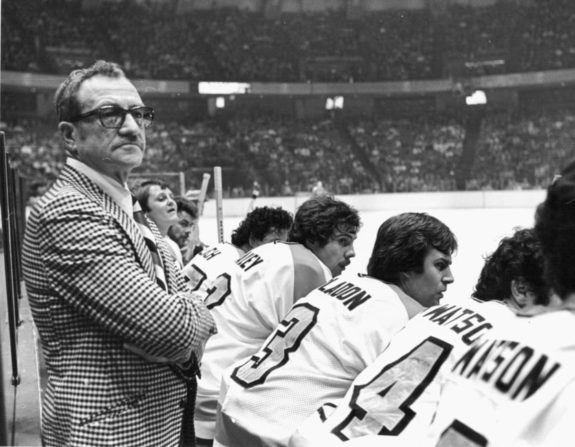
Shero was able to bring out the best in Dupont’s game, and I think the familiarity between the two men helped play a role in his uprise. In my opinion, Dupont is a symbol of the Flyers during their era in the 1970s, and the type of style that they played.
Jimmy Watson
Watson first suited up for Philadelphia during the 1972-73 season. He played a total of 10 seasons with the club, and was able to adapt rather quickly to the NHL game. He fit right in off the bat, and was a significant puzzle piece for the teams he was on.
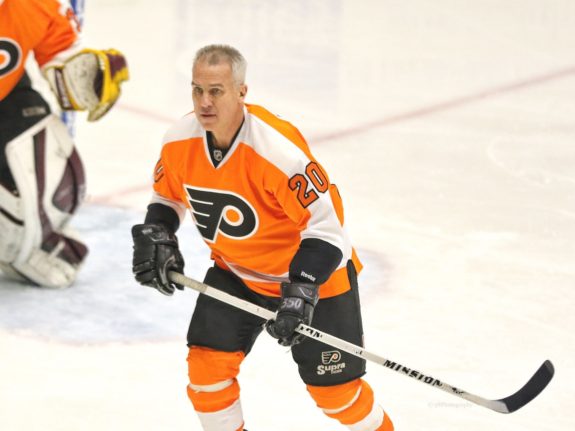
His mindset was always to be the best defenseman that he could be, and was not much of an offensive defenseman as a result. He might not have put up the numbers in that regard, but his impact defensively is what made him a special player for the organization. When it came to his statistics, though, he put up 38 goals and 148 assists during his 613 games.
He was recognized throughout the league over the course of his career, which was only with the Flyers. He was a five-time NHL All-Star, and helped lead Philadelphia to win the Stanley Cup back-to-back years in 1974 (against the Boston Bruins) and 1975 (against the Buffalo Sabres). Watson also won the Barry Ashbee Trophy on multiple occasions. The Flyers recognized Watson as a member of their franchise’s Hall of Fame in 2016.
Jimmy’s brother Joe also played in the NHL, and suited up for the Flyers from 1967 until 1978. He did not start off his pro career with Philadelphia, though, playing in a couple of seasons with the Bruins before eventually making his way onto the Flyers. Over the course of Joe’s entire career, he posted a total of 216 points (38 goals and 178 assists) in 836 games).
Eric Desjardins
Desjardins was acquired by the Flyers in one of the best transactions the team has made in their history in terms of impact. He along with left wingers John LeClair and Gilbert Dionne were traded from the Montreal Canadiens to Philadelphia, with forward Mark Recchi going back the other way.
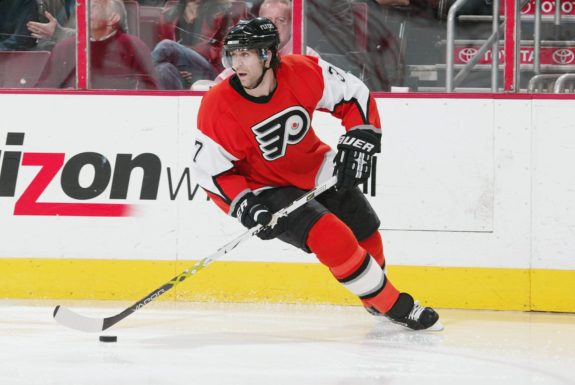
LeClair gets a lot of praise in his part of the trade, including the fact that he was a significant component to the Legion of Doom line along with center Eric Lindros and winger Mikael Renberg. Desjardins made quite the name for himself from that trade as well though. He is second all-time in Flyers defenseman scoring, and suited up for the club in 738 games. His stats from his time in Philadelphia are impressive:
- 1994-95: 5 goals and 18 assists for 23 points in 34 games
- 1995-96: 7 goals and 40 assists in 80 games
- 1996-97: 12 goals and 34 assists in 82 games
- 1997-98: 6 goals and 27 assists for 33 points in 77 games
- 1998-99: 15 goals and 36 assists for 51 points in 68 games
- 1999-00: 14 goals and 41 assists in 81 games
- 2000-01: 15 goals and 33 assists in 79 games
- 2001-02: 6 goals and 19 assists for 25 points in 65 games
- 2002-03: 8 goals and 24 assists for 32 points in 79 games
- 2003-04: 1 goal and 11 assists in 48 games
- 2005-06: 4 goals and 20 assists in 45 games
He brought a lot of experience from his days with the Canadiens, which included winning the Stanley Cup back in 1993 against Wayne Gretzky and the Los Angeles Kings. He was a leader on the blue line, and helped Philadelphia reach their own Stanley Cup Final in 1997 against the Red Wings. Desjardins in total notched 396 points (93 goals and 303 assists).
Mark Howe
Hockey runs in the Howe family, that is for sure. Son of Hockey Hall of Famer and Detroit Red Wings legend Gordie Howe, Mark originally entered the professional hockey scene with the now-defunct Houston Aeros of the World Hockey Association (WHA). He played there along with Gordie and his brother Marty in a very famous father and sons trio. After playing for the Aeros, he spent a few seasons with the New England Whalers (who eventually became the Hartford Whalers).
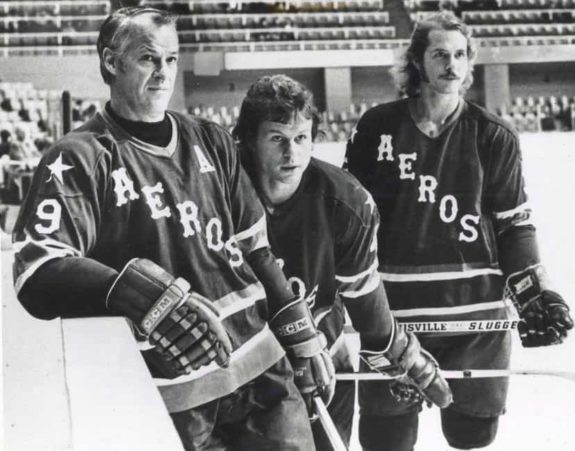
Mark later joined the Flyers through trade from Hartford, and absolutely dominated while he was there. He never won the Norris Trophy as the best defenseman for a single season in the NHL, but he was nominated for the award on a few occasions.
Howe racked up a ton of points, and to this day, remains number one in Flyers history for defensemen scoring. He has a big lead on this accomplishment too, as Desjardins is behind him by 84 points. Howe’s stats as a Flyer are as follows:
- 1982-83: 20 goals and 47 assists in 76 games
- 1983-84: 19 goals and 34 assists for 53 points in 71 games
- 1984-85: 18 goals and 39 assists for 57 points in 73 games
- 1985-86: 24 goals and 58 assists for 82 points in 77 games
- 1986-87: 15 goals and 43 assists in 69 games
- 1987-88: 19 goals and 43 assists in 75 games
- 1988-89: 9 goals and 29 assists in 52 games
- 1989-90: 7 goals and 21 assists in 40 games
- 1990-91: 10 assists in 19 games
- 1991-92: 7 goals and 18 assists for 25 points in 42 games
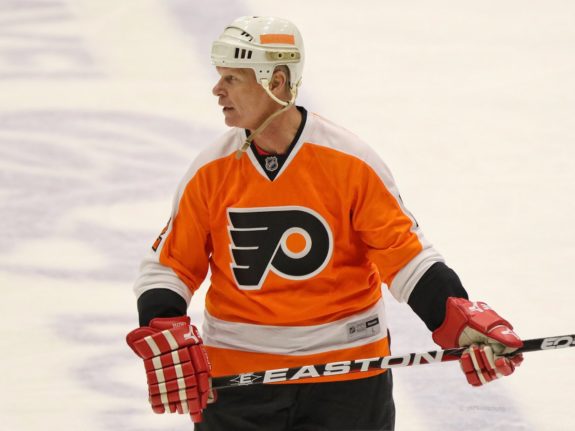
One interesting fact about Howe is that he originally started his career as a forward. He was switched over to defense while playing for Hartford, and it was a move that he originally did not want to do. He had wanted to play forward because of his dad.
With Mark being regarded as arguably the best defenseman in Flyers franchise history, and for everything that he was able to accomplish during his career, it is a good thing he stuck with that change. He was so talented as a player that he made it professionally as a forward, and was able to continually play spectacular making the switch to playing defense. Howe was inducted into the Hockey Hall of Fame in 2011, and had his number two retired by the Flyers in 2012.
Defensively Talented History
Each of these defensemen mentioned made their own impression while they played for the Flyers. They helped create reputations, not only for themselves, but for the teams they were on. They set records and added championships and other accomplishments to their resumes and the organization. There are many other defensemen left off this list who may deserve a nod, but these are some of the best to ever represent the City of Brotherly Love in the NHL.
The post Philadelphia Flyers’ Best Defensemen of All-Time appeared first on The Hockey Writers.
Popular Articles

















































 Blackhawks Chicago
Blackhawks Chicago Panthers Florida
Panthers Florida Penguins Pittsburgh
Penguins Pittsburgh Rangers New York
Rangers New York Avalanche Colorado
Avalanche Colorado Kings Los Angeles
Kings Los Angeles Maple Leafs Toronto
Maple Leafs Toronto Bruins Boston
Bruins Boston Capitals Washington
Capitals Washington Flames Calgary
Flames Calgary Oilers Edmonton
Oilers Edmonton Golden Knights Vegas
Golden Knights Vegas Flyers Philadelphia
Flyers Philadelphia Senators Ottawa
Senators Ottawa Lightning Tampa Bay
Lightning Tampa Bay Red Wings Detroit
Red Wings Detroit Islanders New York
Islanders New York Sabres Buffalo
Sabres Buffalo Devils New Jersey
Devils New Jersey Hurricanes Carolina
Hurricanes Carolina Stars Dallas
Stars Dallas Jets Winnipeg
Jets Winnipeg Blue Jackets Columbus
Blue Jackets Columbus Predators Nashville
Predators Nashville Wild Minnesota
Wild Minnesota Blues St. Louis
Blues St. Louis Mammoth Utah
Mammoth Utah Ducks Anaheim
Ducks Anaheim Sharks San Jose
Sharks San Jose Canucks Vancouver
Canucks Vancouver






